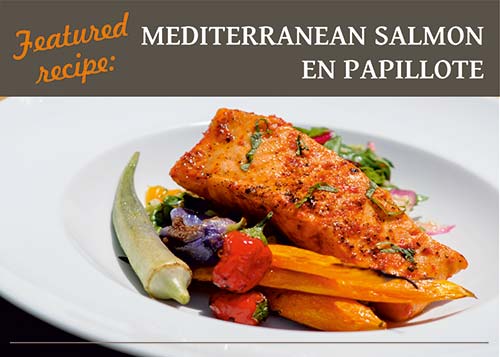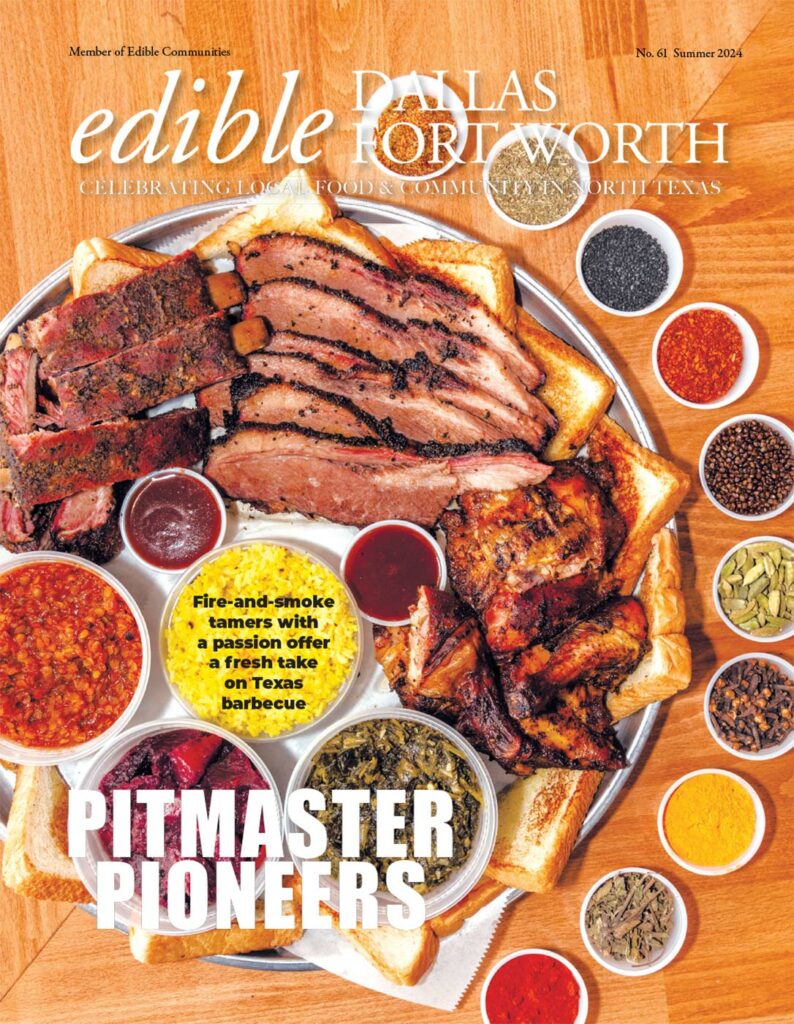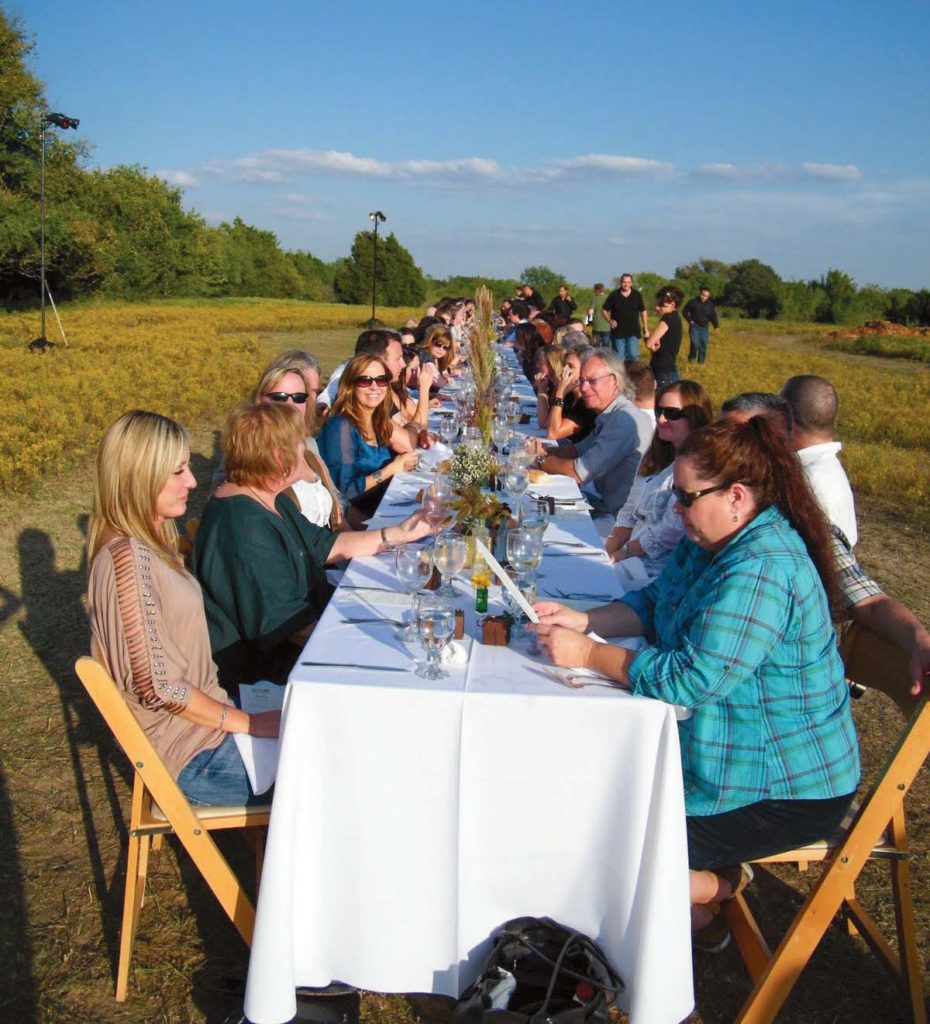
Celebrating Wine and Food in North Texas
“Corn in the fields. Listen to the rice when the wind blows ’cross the water. King Harvest has surely come.” – The Band
Imagine white-clothed communal tables garnished with floral arrangements positioned in front of plates of fresh produce with full glasses of wine. The tables are surrounded by swaying wildflowers on a farm under the seduction of a hazy October evening sky providing weather rarely felt in Texas. This humble, rather bewitching, scene is how the initial Chefs for Farmers Food and Wine Festival began in 2010 at farmer Marie Tedei’s Eden’s Garden CSA Farm. A simple idea meant to breed relationships between farmers and chefs to the delight of over 100 hungry guests who benefitted from this comradery conjured by founder Iris Midler.
“I was asked if I would be interested in hosting a long table dinner at my farm,” Tedei recalls. “These had not ever been done before in the Dallas-Fort Worth area, short of a chef-driven round table formal dinner I had held the year before. Because I had it and knew the reaction of the guests who had attended, I felt like it would be a great idea.”
And that inaugural event’s outcome?
“At one time I had 20 chefs on a group text each week and made weekly deliveries. It was more than I could produce on my own so I oft en coordinated with other farmers for the chefs, which helped move produce for those farmers who did not have the firsthand connection,” explained Tedei.
Now going into its 10th year the roots remain. Those roots have only grown deeper and the festival has blossomed into a mutually beneficial multi-faceted annual event for both farmers and chefs that thousands of guests are able to revel in. Although the event has emerged as a culinary tour de force, the original premise remains that farmers and chefs are paired together to cooperate on a dish that attendees are able to taste and vote on for best dish.
Midler reminisces about the growing pains of the early years. “Chefs for Farmers was extremely organic. It was very hard to cover costs, we had many freelancers, lots of tears, many late nights working and not sleeping, pure chaos at times. Overall, the beginning was tumultuous but it has paid off thanks to our amazing partners, sponsors, and volunteer efforts. Even years later chef John Tesar single-handedly saved the event by breathing new life into it.”
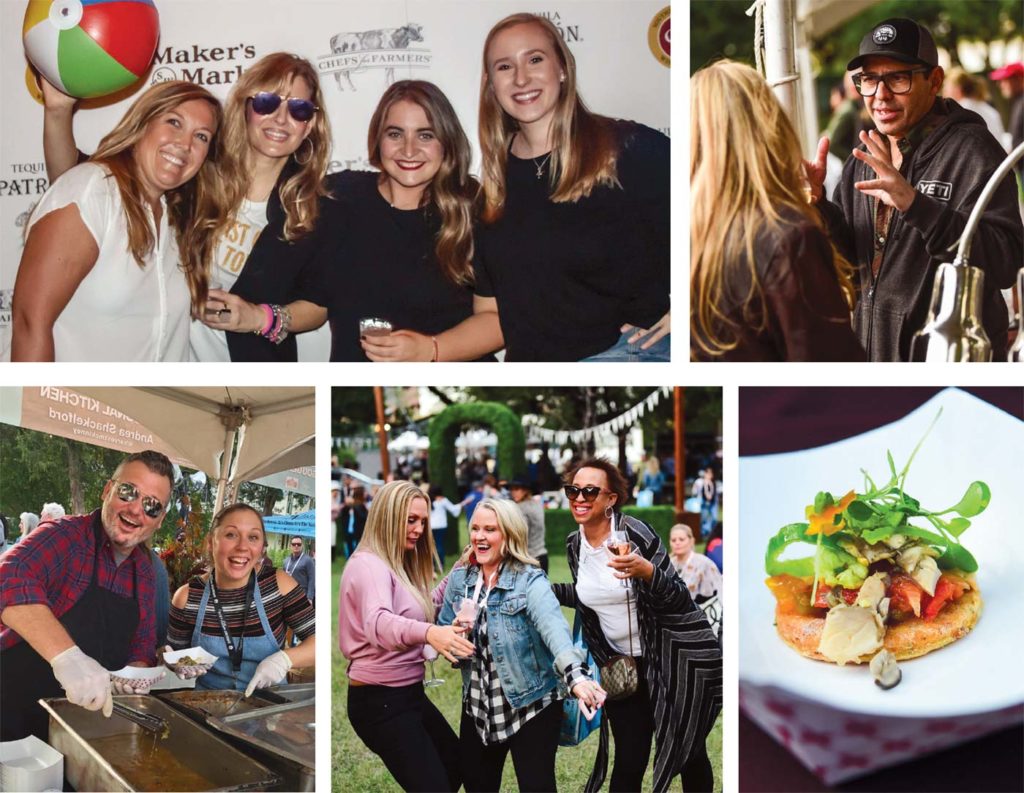
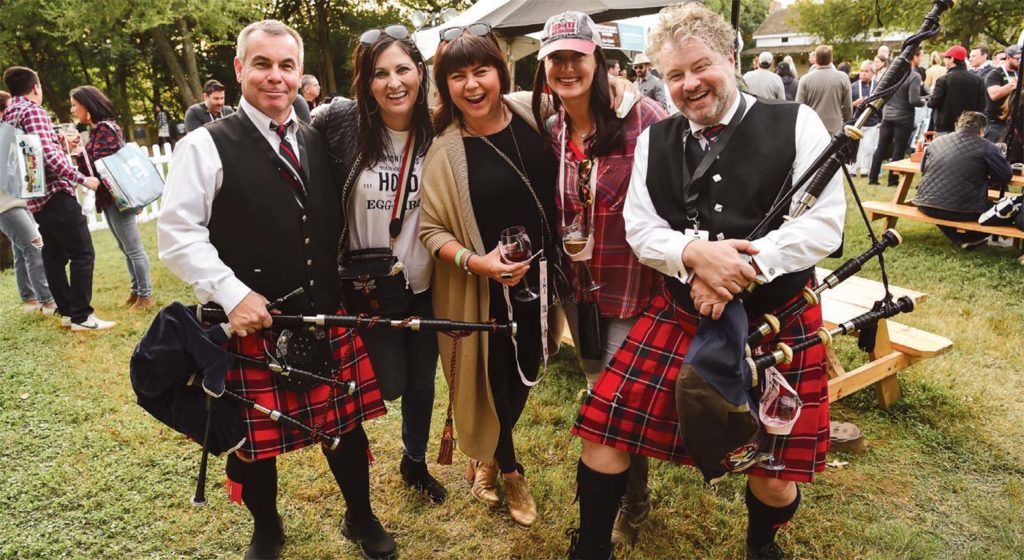
Although a handful of Dallas-based chefs had working relationships with regional farmers and growers through their practices of sustainability and utilizing local organic food, Midler saw an area that needed to be expanded on for the betterment of both farmers and chefs.
“What prompted me to start the dinner? My ex-husband is a chef and he would drive out to farms on his days off to work with these farmers. The problem was if they did not sell to a few chefs it was a moot point for the farmers to justify making the drive to deliver for just one chef. These farmers needed more business and to make it worthwhile to drive to the city,” Midler says. “On the flip side, many chefs could not drive on their one day off to see the farmers, either. So I thought why not connect some of them and hopefully, they all work together and they did.”
Since 2010, Chefs for Farmers has evolved from a field dinner party for 100 people to a one-day event with 800 ticket buyers at Turtle Creek Park to a three-day celebration for over 4,000 people that has held events at Victory Park and the Dallas Farmers Market with Dallas Heritage Village as the main day’s current home. The festival has garnered national attention from USA Today and Huffington Post to hometown support from the City of Dallas illuminating “CFF” on the Omni hotel. Local chefs and chefs from across the United States receive invites to cook up something special while never losing focus of the sole purpose – local farmers.
Last year’s three-day hoorah (that technically would have been the 10th anniversary) was sidelined due to COVID-19 and the virus’ effects sent shockwaves throughout the restaurant industry as a whole. Everyone from restaurant owners and service employees to the logistical side, such as event companies and delivery services, were negatively affected.
In April 2021, Fortune published a report from Datassential stating 10.2 percent of all U.S. restaurants had permanently shuttered since March 2020. Those numbers work out to 79,438 closures out of the 778,807 operating at the onset of the pandemic. The National Restaurant Association’s numbers were more bleak, acknowledging approximately 17 percent or about 110,000 restaurants had closed. A positive take from Datassential’s report was that locally-owned restaurants fared much better than chain restaurants as communities tended to rally around their neighborhood favorites.
“In the field of opportunity, it’s plowin’ time again.” – Neil Young
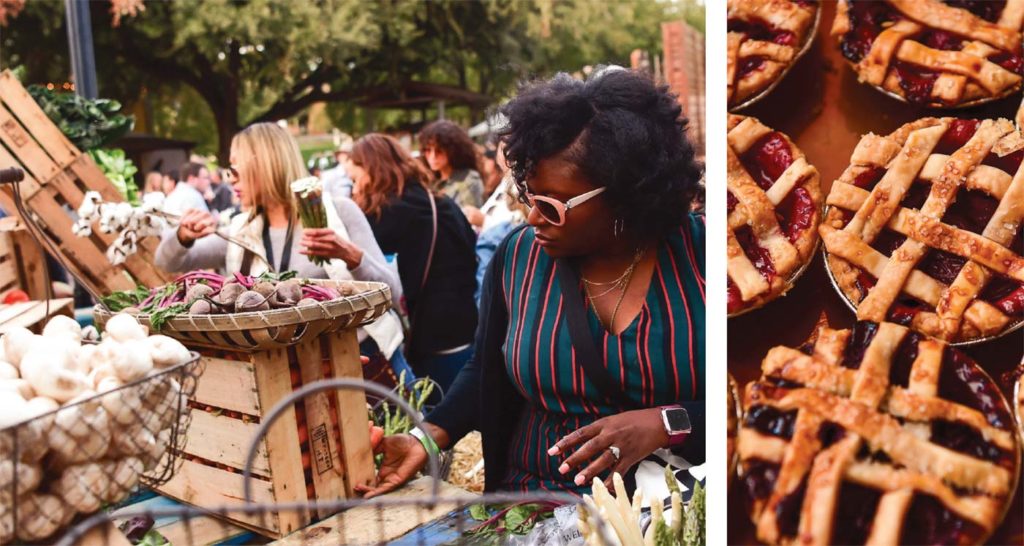
While the monetary impact on local farms and ranchers might never fully be realized in terms of loss as the virus continues to be grappled with, some local growers found a way to sustain and capitalize. Mushroom farmer Jordan Jent of Texas Fungus, who has been involved with Chefs for Farmers for three years, was able to fill community needs.
“COVID was originally a curse but turned out to be a blessing because it forced us to become better farmers,” says Jent. “We decided to grow eight species of mushroom instead of four, allowing us to branch out into eight farmer’s markets instead of two. We also began supplying Central Market as well.”
Putting numbers on the impact of having the annual festival, Jent explains what Chefs for Farmers has meant for Texas Fungus. “The growth has been good. We have gained around 50 percent more new clients after the event each year and the more familiar faces you see, the better. If one year is missed, we count that as an opportunity missed. When COVID was very heavy, the need for local food was even more important with food supply chain problems from mega-farms. Local food became necessary for most people just to provide for their families. Chefs for Farmers gives the patron the ability to connect with those who grow the food we nourish ourselves with. If you don’t know where and who your food is coming from, it’s very difficult to build community.”
Festival alum Chef Andrea Shackleford of Harvest in McKinney, a pioneer in the farm-to-table movement, agrees with Jent based on her interactions with local farmers.
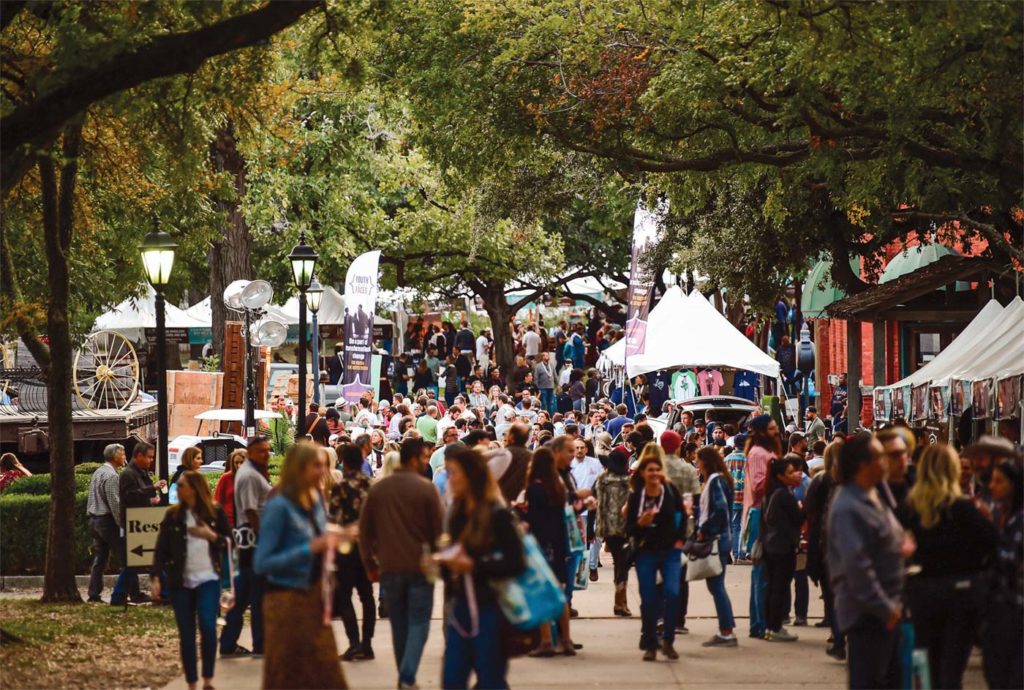
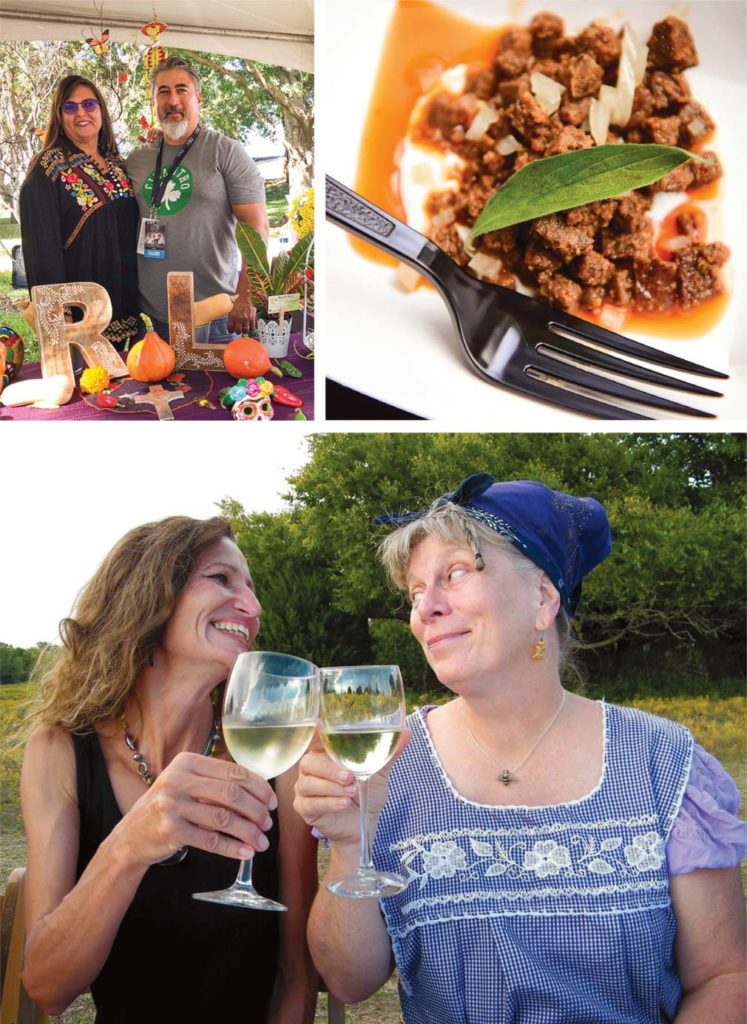
“Funny enough, all of the farmers and ranchers I know actually did better because of retail sales, but they did lose a lot of wholesale. An Austin-area farmer told me how he had to shift to retail and it was difficult from a standpoint of packaging, marketing and product distribution.”
After picking up the pieces from last year’s absence of Chefs for Farmers, Midler’s resiliency to continue the mission in the wake of a pandemic is stirring. Even laying out her vision for the future, she persists. Virus be damned.
“We have been able to provide the ability for chefs and farmers to meet, visit each other’s farms and restaurants, foster relationships to become allies for sustainability. Ultimately we would like to expand to other culinary-driven cities and connect those chefs with their local farmers,” she says.
“I had an idea of what Chefs for Farmers would become, and while I’m still not there yet, we won’t stop until we arrive.”
On a sweltering August afternoon in the tiny Northeast Texas town of Cooper, Rae Lili Farm owner Sofia Herrera-Martinez expands on what being part of Chefs for Farmers for seven years means to her.
“Chefs for Farmers aims to harness the mysticism and awareness rooted in agriculture and traditions. Knowing your farmer and being included in the festivities is marvelous. It unites inspiring conversations and we love being a part of it. Growing vegetables is like growing relationships; they both take time, but it’s so worth the effort. We focused on pursuing those relationships, which led to expanding and developing new ideas for the future of our farm. Our business has expanded from Dallas to include Fort Worth and surrounding areas. It has been a source of great joy from an agricultural and personal view. Willing yourself and digging deep as a farmer to achieve the best for your family and community is rewarding. Cultivating food is triumphing over hardships.”


